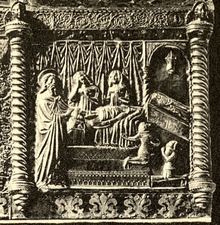Ban Stephen II of Bosnia
| Stephen II | |
|---|---|

Detail of the scene The Death of Ban Kotromanič depicted on the Chest of Saint Simeon.
|
|
| Ban of Bosnia | |
| Reign | 1322–1353 |
| Predecessor | Stephen I |
| Successor | Tvrtko I |
| Born | 14th century Bosnia |
| Died | September 1353 Bosnia |
| Burial | Mile, near Visoko |
| Spouse |
a countess of Ortenburg a Bulgarian princess Elizabeth of Kuyavia |
| Issue |
Elizabeth, Queen of Hungary Catherine, Countess of Cilli? |
| House | House of Kotromanić |
| Father | Stephen I, Ban of Bosnia |
| Mother | Elizabeth of Serbia |
| Religion | Bosnian Christian, from 1347 Roman Catholic |
Stephen II (Serbo-Croatian: Stjepan/Stefan, Стефан/Стјепан) was the Bosnian Ban from 1314, but in reality from 1322 to 1353 together with his brother, Vladislav in 1326–1353. He was the son of Bosnian Ban Stephen I Kotroman and Elizabeth, sister of King Stephen Vladislav II of Syrmia. Throughout his reign in the fourteenth century, Stephen ruled the lands from Sava to the Adriatic and from Cetina to Drina. He was a member of the Kotromanić dynasty. He was buried in his Franciscan church in Mile, near Visoko, Bosnia.
A member of the Kotromanić, there are sources that state that Stephen II was a "patarene" (see Bosnian Church).
When his father died in 1314 and Croatian Ban Mladen II Šubić emerged as Count of Zadar, Princeps of Dalmatia and Second Bosnian Ban, Stephen's mother Elizabeth took him and his siblings and fled with them into exile to the Republic of Dubrovnik. Mladen was not popular in Bosnia and had fought bloody but losing wars against the Serbian Kingdom (under Stephen Uroš II Milutin), and the Venetians (to whom he lost Zadar in 1313), along with numerous internal opponents of his regime. Mladen came to the idea to impose Stjepan Kotromanić as his vassal in Bosnia, for he was sure that he would be well accepted in Bosnia. The Šubić, vengeful enemies of the House of Kotromanić now became their protectors. Mladen decided to keep Stephen II under his firm grip and to use him to eradicate the Bosnian Church, so he arranged a marriage between Stephen and a Princess from the family of the Count Meinhard of Ortenburg that ruled in Carniola. The Pope was against the marriage since both families were of same German roots, but it would give Stephen certain advantages, so he convinced the Pope to allow it.
...
Wikipedia
